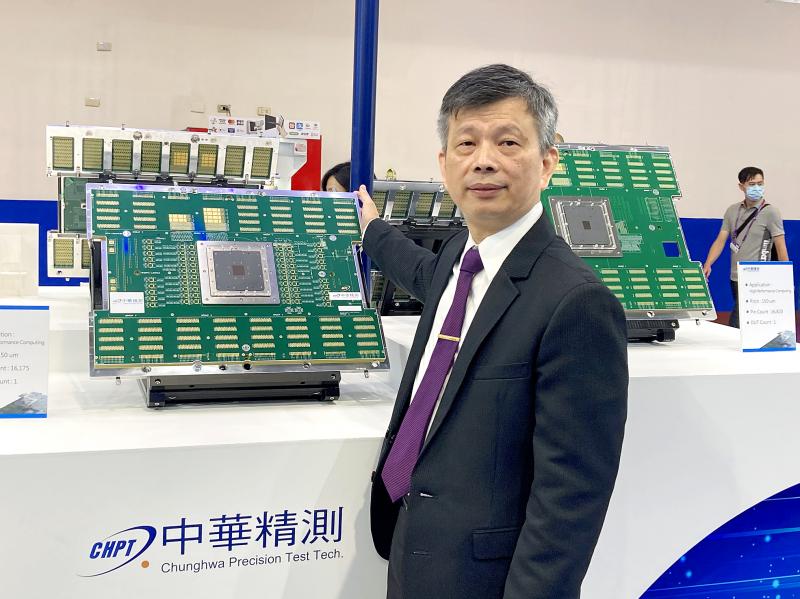Chunghwa Precision Test Technology Co (CHPT, 中華精測), a supplier of probe cards used for silicon wafer testing, is cautiously optimistic about its business outlook for next year, bolstered by robust demand for vertical probe cards (VPC) and testing demand for high-performance-computing (HPC) chips, a company official said yesterday.
Revenue from the high-margin VPC business is expected to grow by a double-digit percentage next year compared with this year, which would boost VPC’s contribution to more than 25 percent of overall revenue, CHPT president Scott Huang (黃水可) told reporters on the sidelines of a media briefing in Taipei.
The company reported NT$1.06 billion (US$36.16 million) in revenue last quarter, with VPC accounting for 22 percent.

Photo: Lisa Wang, Taipei Times
“We are cautiously optimistic about next year’s business,” Huang said. “The main growth drivers are VPC and HPC.”
CHPT plans to boost its needle planting machines’ monthly capacity by more than 66 percent before the end of the year to 1 million pins from 600,000 pins now, Huang said.
Testing demand for 5G-related chips are also on the rise, as 5G smartphone production is forecast to surge to more than 500 million units next year from an estimated 206 million units this year, he said.
CHPT is also gaining new customers in other fields, as a growing number of companies worldwide are attempting to develop their own chips, he added.
CHPT said it has a good chance to break into the world’s top 10 probe card suppliers this year, after ranking 18th last year.
Asked about order losses from Huawei Technologies Co (華為) due to the US’ export restrictions, Huang said that orders from new customers would fill the void left by the Chinese company, although the adjustments might take some time.
CHPT counts the world’s two major 5G chip suppliers — Qualcomm Inc and MediaTek Inc (聯發科) — among its top clients.
Taiwan Semiconductor Manufacturing Co (台積電), the sole chip supplier to Apple Inc’s iPhone series, is also a customer.
Gross margin rose to 54.1 percent last quarter, from 52.6 percent in the first quarter and 51.9 percent in the second quarter of last year, company data showed.
Gross margin next year is forecast to range between 50 and 55 percent, Huang said.
CHPT said that it set up a smart automation business group earlier this month.
The company is showcasing its smart manufacturing solutions using artificial intelligence technology at the three-day through today in Taipei.

Among the rows of vibrators, rubber torsos and leather harnesses at a Chinese sex toys exhibition in Shanghai this weekend, the beginnings of an artificial intelligence (AI)-driven shift in the industry quietly pulsed. China manufactures about 70 percent of the world’s sex toys, most of it the “hardware” on display at the fair — whether that be technicolor tentacled dildos or hyper-realistic personalized silicone dolls. Yet smart toys have been rising in popularity for some time. Many major European and US brands already offer tech-enhanced products that can enable long-distance love, monitor well-being and even bring people one step closer to

Malaysia’s leader yesterday announced plans to build a massive semiconductor design park, aiming to boost the Southeast Asian nation’s role in the global chip industry. A prominent player in the semiconductor industry for decades, Malaysia accounts for an estimated 13 percent of global back-end manufacturing, according to German tech giant Bosch. Now it wants to go beyond production and emerge as a chip design powerhouse too, Malaysian Prime Minister Anwar Ibrahim said. “I am pleased to announce the largest IC (integrated circuit) Design Park in Southeast Asia, that will house world-class anchor tenants and collaborate with global companies such as Arm [Holdings PLC],”

Thousands of parents in Singapore are furious after a Cordlife Group Ltd (康盛人生集團), a major operator of cord blood banks in Asia, irreparably damaged their children’s samples through improper handling, with some now pursuing legal action. The ongoing case, one of the worst to hit the largely untested industry, has renewed concerns over companies marketing themselves to anxious parents with mostly unproven assurances. This has implications across the region, given Cordlife’s operations in Hong Kong, Macau, Indonesia, the Philippines and India. The parents paid for years to have their infants’ cord blood stored, with the understanding that the stem cells they contained

Sales in the retail, and food and beverage sectors last month continued to rise, increasing 0.7 percent and 13.6 percent respectively from a year earlier, setting record highs for the month of March, the Ministry of Economic Affairs said yesterday. Sales in the wholesale sector also grew last month by 4.6 annually, mainly due to the business opportunities for emerging applications related to artificial intelligence (AI) and high-performance computing technologies, the ministry said in a report. The ministry forecast that retail, and food and beverage sales this month would retain their growth momentum as the former would benefit from Tomb Sweeping Day